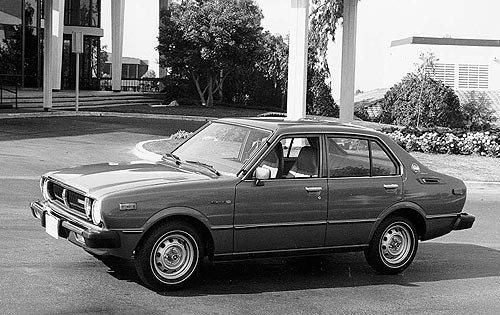 |
| 1970 Chrysler LeBaron Imperial |
In October 1973, members of the Organization of Arab Petroleum Exporting Countries (OPEC) proclaimed for an oil embargo, which initially targeted the United States, United Kingdom, Canada, Japan, as well as the Netherlands. This embargo was imposed as retaliation for the United States' decision to re-supply the Israeli military, amid the Arab-Israeli War, thus granting leverage in the post-war peace negotiations. This would later include South Africa, Rhodesia, and Portugal. Termed as the "first oil shock", the price of oil had risen by approximately four-hundred percent. At the time, a barrel of oil would cost three USD, so it was raised to twelve dollars globally. With oil being costly and difficult to come by for many Americans, most could no longer afford to drive as frequently as they did. Over time, many restrictions were implemented, such as the national maximum speed limit of 55 MPH, limitations to racing events including Daytona and NASCAR, as well as larger domestic luxury vehicles no longer being produced, among others, as a result.
The "Big Three" U.S. auto producers, that being General Motors, Ford, and Chrysler had dominated the market since its inception. The oil embargo gave way for both the Japanese as well as European automakers to expand into U.S. territory, infiltrating the market with smaller, lighter, better constructed, and more fuel-efficient vehicles. Instead of high-displacement, gas-guzzling V8s or I6s powering large, heavy cars, smaller 4 cylinder engines were used, in addition to a shift to front-wheel drive layouts that would dominate the 1980s and 1990s. Many individuals made the switch over, which increased the market share of companies like Honda, Toyota, Mazda, Datsun (later to become Nissan), BMW, Mercedes and Audi over the U.S. market. The U.S. was no longer dominated by domestic producers, as it had been since cars became an integral aspect of American life. This switch over to imports greatly changed the U.S. auto industry, as more Americans became conscious of gas prices and fuel economy. Even today, the market is continually dominated by the likes of Japanese and European producers whilst American manufactures, especially GM and Chrysler, exist as former shells of their past glory and market share. This legacy continues, with the best-selling cars today being imports and from otherwise nondomestic companies, like Toyota.
 |
| 1979 Toyota Corolla 4D |
https://www.thetruthaboutcars.com/2013/10/the-1973-oil-crisis-40-years-later/
https://en.wikipedia.org/wiki/1973_oil_crisis
https://www.edmunds.com/most-popular-cars/
https://www.wardsauto.com/news-analysis/energy-crisis-aided-japanese-imports
https://en.wikipedia.org/wiki/1973_oil_crisis
https://www.edmunds.com/most-popular-cars/
https://www.wardsauto.com/news-analysis/energy-crisis-aided-japanese-imports
I didn't know that the oil crisis had such a profound impact on America's automotive industry! While researching, I found that the economy and America's economic policies were largely shaped from the oil crisis as well. The government, seeing as how the oil crisis was devastating Americans, created new regulations and laws to prevent future crises. For example, liberals in Congress created policies to control oil prices and antitrust initiatives, which both altered the economy.
ReplyDeletehttps://www.marketplace.org/2016/05/31/how-oil-shortage-1970s-shaped-todays-economic-policy/
I enjoyed how your blog used numerical data to show exactly how big the price increase was. One thing that you mentioned was the decrease in American auto manufacturing. I researched this topic, and found that Detroit and other American plants are still struggling. Due to the new craze with SUV's throughout the world, specifically in America. Since 2010, the overall sales of cars have decreased by around 30%, while SUV production has increased by around 5 million.This increase has caused a significant decrease in sales, and also created excess of smaller cars, similar to Detroit in the 1980's.
ReplyDeleteSource:https://www.bloomberg.com/news/articles/2019-01-13/the-next-american-car-recession-has-already-started